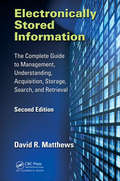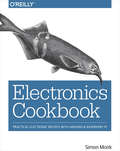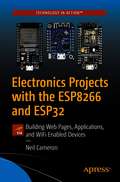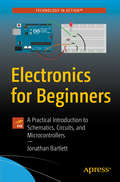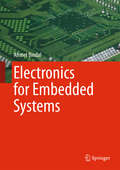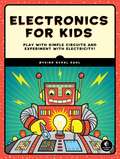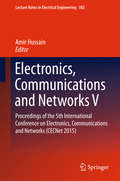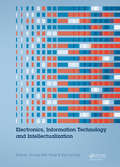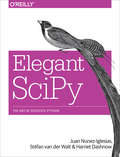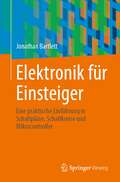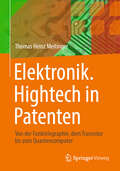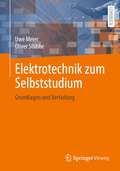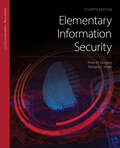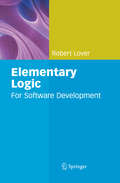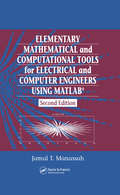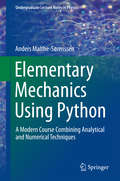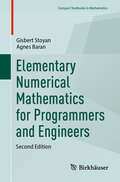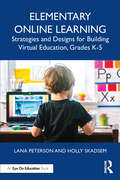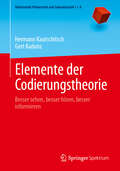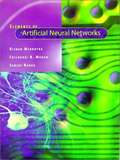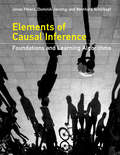- Table View
- List View
Electronic and Magnetic Excitations in Correlated and Topological Materials (Springer Theses)
by John S. Van DykeThis thesis reports a major breakthrough in discovering the superconducting mechanism in CeCoIn5, the “hydrogen atom” among heavy fermion compounds. By developing a novel theoretical formalism, the study described herein succeeded in extracting the crucial missing element of superconducting pairing interaction from scanning tunneling spectroscopy experiments. This breakthrough provides a theoretical explanation for a series of puzzling experimental observations, demonstrating that strong magnetic interactions provide the quantum glue for unconventional superconductivity. Additional insight into the complex properties of strongly correlated and topological materials was provided by investigating their non-equilibrium charge and spin transport properties. The findings demonstrate that the interplay of magnetism and disorder with strong correlations or topology leads to complex and novel behavior that can be exploited to create the next generation of spin electronics and quantum computing devices.
Electronically Stored Information: The Complete Guide to Management, Understanding, Acquisition, Storage, Search, and Retrieval
by David MatthewsAlthough we live in an era in which we are surrounded by an ever-deepening fog of data, few of us truly understand how the data are created, where data are stored, or how to retrieve or destroy data—if that is indeed possible. This book is for all of you, whatever your need or interest. <p><P>Electronically Stored Information: The Complete Guide to Management, Understanding, Acquisition, Storage, Search, and Retrieval, Second Edition explains the reasons you need to know about electronic data. It also gets into great detail about the how, what, when, and where of what is known in legal circles as electronically stored information (ESI). <p><P>With easy-to-understand explanations and guidelines, this book provides the practical understanding you need to effectively manage the complex world of ESI. Whether you are an attorney, judge, paralegal, business manager or owner, or just one of the ever-growing population of computer users, you will benefit from the information presented in this book.
Electronics Cookbook: Practical Electronic Recipes with Arduino and Raspberry Pi
by Simon MonkIf you’re among the many hobbyists and designers who came to electronics through Arduino and Raspberry Pi, this cookbook will help you learn and apply the basics of electrical engineering without the need for an EE degree. Through a series of practical recipes, you’ll learn how to solve specific problems while diving into as much or as little theory as you’re comfortable with.Author Simon Monk (Raspberry Pi Cookbook) breaks down this complex subject into several topics, from using the right transistor to building and testing projects and prototypes. With this book, you can quickly search electronics topics and go straight to the recipe you need. It also serves as an ideal reference for experienced electronics makers.This cookbook includes:Theoretical concepts such as Ohm’s law and the relationship between power, voltage, and currentThe fundamental use of resistors, capacitors and inductors, diodes, transistors and integrated circuits, and switches and relaysRecipes on power, sensors and motors, integrated circuits, and radio frequency for designing electronic circuits and devicesAdvice on using Arduino and Raspberry Pi in electronics projectsHow to build and use tools, including multimeters, oscilloscopes, simulations software, and unsoldered prototypes
Electronics Projects with the ESP8266 and ESP32: Building Web Pages, Applications, and WiFi Enabled Devices
by Neil CameronDiscover the powerful ESP8266 and ESP32 microcontrollers and their Wi-Fi communication. The ESP32 microcontroller features Bluetooth and BLE communication in addition to Wi-Fi. The book emphasizes practical projects and readers are guided through Wi-Fi and Bluetooth communication, mobile app design and build, ESP-NOW and LoRa communication, and signal generation. Projects throughout the book utilize the Wi-Fi functionality and processing power of the ESP microcontrollers. Projects are built in the Arduino IDE, so you don't need to download other programming software. Mobile apps are now ubiquitous, making the app build projects of the book very relevant, as are the web page design projects. In Electronics Projects with the ESP8266 and ESP32, you'll see how easy and practical it is to access information over the internet, develop web pages, build mobile apps to remotely control devices with speech recognition or incorporate Google Maps in a GPS route tracking app. You will · Build practical electronics projects with an ESP8266 or ESP32 microcontroller with Wi-Fi communication · Use the Wi-Fi function of the ESP8266 and ESP32 to update web pages · Communicate with your mobile phone or smart watch by Bluetooth Low Energy · Transmit and receive information to control remote devices over the internet · Understand the design and build of mobile apps for internet based applications · Apply your computer programming skills in C++, JavaScript, AJAX and JSON · Use WebSocket, MQTT brokers and IFTTT for fast two-way communication with webpagesWho This Book Is ForThe target audience is for Makers and Tinkerers who want to build internet/intranet based applications with more powerful microcontrollers, such as the ESP8266 or ESP32. A level of C++ programming expertise with the Arduino IDE is assumed, although all sketches are fully described and comprehensively commented.
Electronics for Beginners: A Practical Introduction to Schematics, Circuits, and Microcontrollers
by Jonathan BartlettJump start your journey with electronics! If you’ve thought about getting into electronics, but don’t know where to start, this book gives you the information you need. Starting with the basics of electricity and circuits, you'll be introduced to digital electronics and microcontrollers, capacitors and inductors, and amplification circuits – all while gaining the basic tools and information you need to start working with low-power electronics.Electronics for Beginners walks the fine line of focusing on projects-based learning, while still keeping electronics front and center. You'll learn the mathematics of circuits in an uncomplicated fashion and see how schematics map on to actual breadboards. Written for the absolute beginner, this book steers clear of being too math heavy, giving readers the key information they need to get started on their electronics journey.What You’ll LearnReview the basic “patterns” of resistor usage—pull up, pull down, voltage divider, and current limiterUnderstand the requirements for circuits and how they are put togetherRead and differentiate what various parts of the schematics doDecide what considerations to take when choosing componentsUse all battery-powered circuits, so projects are safeWho This Book Is ForMakers, students, and beginners of any age interested in getting started with electronics.
Electronics for Embedded Systems
by Ahmet BindalThis book provides semester-length coverage of electronics for embedded systems, covering most common analog and digital circuit-related issues encountered while designing embedded system hardware. It is written for students and young professionals who have basic circuit theory background and want to learn more about passive circuits, diode and bipolar transistor circuits, the state-of-the-art CMOS logic family and its interface with older logic families such as TTL, sensors and sensor physics, operational amplifier circuits to condition sensor signals, data converters and various circuits used in electro-mechanical device control in embedded systems. The book also provides numerous hardware design examples by integrating the topics learned in earlier chapters. The last chapter extensively reviews the combinational and sequential logic design principles to be able to design the digital part of embedded system hardware.
Electronics for Kids: Play with Simple Circuits and Experiment with Electricity!
by Oyvind Nydal Dahl<P>Why do the lights in a house turn on when you flip a switch? How does a remote-controlled car move? And what makes lights on TVs and microwaves blink? The technology around you may seem like magic, but most of it wouldn’t run without electricity.Electronics for Kids demystifies electricity with a collection of awesome hands-on projects. <P>In Part 1, you’ll learn how current, voltage, and circuits work by making a battery out of a lemon, turning a metal bolt into an electromagnet, and transforming a paper cup and some magnets into a spinning motor. <P> In Part 2, you’ll make even more cool stuff as you: <br>–Solder a blinking LED circuit with resistors, capacitors, and relays <br>–Turn a circuit into a touch sensor using your finger as a resistor–Build an alarm clock triggered by the sunrise <br>–Create a musical instrument that makes sci-fi sounds. <P>Then, in Part 3, you’ll learn about digital electronics—things like logic gates and memory circuits—as you make a secret code checker and an electronic coin flipper. Finally, you’ll use everything you’ve learned to make the LED Reaction Game—test your reaction time as you try to catch a blinking light!With its clear explanations and assortment of hands-on projects, Electronics for Kids will have you building your own circuits in no time.
Electronics, Communications and Networks V
by Amir HussainThis book comprises peer-reviewed contributions presented at the 5th International Conference on Electronics, Communications and Networks (CECNet 2015), held in Shanghai, China, 12-15 December, 2015. It includes new multi-disciplinary topics spanning a unique depth and breadth of cutting-edge research areas in Electronic Engineering, Communications and Networks, and Computer Technology. More generally, it is of interest to academics, students and professionals involved in Consumer Electronics Technology, Communication Engineering and Technology, Wireless Communication Systems and Technology, and Computer Engineering and Technology.
Electronics, Information Technology and Intellectualization: Proceedings of the International Conference EITI 2014, Shenzhen, China, 16-17 August 2014
by Kyung Sup Kwak Young Min SongThe International Conference on Electronics, Information Technology and Intellectualization (ICEITI2014) was dedicated to build a high-level international academic communication forum for international experts and scholars. This fi rst conference of an annual series was held in Pengcheng, Shenzhen, China 16-17 August 2014. Many prestigious experts
Elegant SciPy: The Art of Scientific Python
by Harriet Dashnow Juan Nunez-Iglesias Stéfan van der WaltWelcome to Scientific Python and its community. If you’re a scientist who programs with Python, this practical guide not only teaches you the fundamental parts of SciPy and libraries related to it, but also gives you a taste for beautiful, easy-to-read code that you can use in practice. You’ll learn how to write elegant code that’s clear, concise, and efficient at executing the task at hand.Throughout the book, you’ll work with examples from the wider scientific Python ecosystem, using code that illustrates principles outlined in the book. Using actual scientific data, you’ll work on real-world problems with SciPy, NumPy, Pandas, scikit-image, and other Python libraries.Explore the NumPy array, the data structure that underlies numerical scientific computationUse quantile normalization to ensure that measurements fit a specific distributionRepresent separate regions in an image with a Region Adjacency GraphConvert temporal or spatial data into frequency domain data with the Fast Fourier TransformSolve sparse matrix problems, including image segmentations, with SciPy’s sparse modulePerform linear algebra by using SciPy packagesExplore image alignment (registration) with SciPy’s optimize moduleProcess large datasets with Python data streaming primitives and the Toolz library
Elektronik für Einsteiger: Eine praktische Einführung in Schaltpläne, Schaltkreise und Mikrocontroller
by Jonathan BartlettBeginnen Sie Ihre Reise in die Welt der Elektronik! Wenn Sie mit dem Gedanken spielen, in die Elektronik einzusteigen, aber nicht wissen, wo Sie anfangen sollen, gibt Ihnen dieses Buch die Informationen, die Sie brauchen. Beginnend mit den Grundlagen von Elektrizität und Schaltkreisen werden Sie in die digitale Elektronik und Mikrocontroller, Kondensatoren und Induktivitäten sowie Verstärkerschaltungen eingeführt - und erhalten gleichzeitig die grundlegenden Werkzeuge und Informationen, die Sie für die Arbeit mit Elektronik mit geringem Stromverbrauch benötigen.Electronics for Beginners schafft den Spagat, sich auf projektbasiertes Lernen zu konzentrieren und gleichzeitig die Elektronik in den Mittelpunkt zu stellen. Sie lernen die Mathematik der Schaltkreise auf unkomplizierte Weise kennen und sehen, wie Schaltpläne auf echten Breadboards abgebildet werden. Dieses Buch ist für den absoluten Anfänger geschrieben und vermeidet es, zu mathematisch zu sein. Es gibt den Lesern die Schlüsselinformationen, die sie brauchen, um mit ihrer Reise in die Elektronik zu beginnen.Was Sie lernen werden· Wiederholung der grundlegenden "Muster" für die Verwendung von Widerständen - Pull-up, Pull-down, Spannungsteiler und Strombegrenzer· die Anforderungen an Schaltkreise und deren Aufbau verstehen· Lesen und Unterscheiden, was die verschiedenen Teile des Schaltplans bewirken welche Überlegungen Sie bei der Auswahl der Komponenten anstellen müssen· Verwenden Sie ausschließlich batteriebetriebene Schaltkreise, damit die Projekte sicher sind.Für wen dieses Buch bestimmt istPraktiker, Studenten und Anfänger jeden Alters, die sich für den Einstieg in die Elektronik interessieren.
Elektronik. Hightech in Patenten: Von der Funktelegraphie, dem Transistor bis zum Quantencomputer
by Thomas Heinz MeitingerElektronische Schaltungen werden heutzutage zumeist aus kristallinen Halbleitern hergestellt, in die Fremdatome eingebracht werden (Dotierung). Die Anfänge der Elektronik kennzeichnen jedoch die Elektronenröhren, mit denen die ersten gleichrichtenden und schaltenden Funktionen verwirklicht wurden. Die ersten, auf dieser Technologie basierenden Computer hatten eine geringe Leistung, wiesen dennoch gewaltige räumliche Ausmaße auf. Erst mit der Verwendung von dotierten Halbleitern begann die Miniaturisierung und die dynamische Entwicklung der Elektronik. Dieses Buch zeigt die Entwicklung der hierfür erforderlichen Elektronik von der Analogtechnik mit den Operationsverstärkern über die Digitaltechnik, die letzten Endes ins Computerzeitalter geführt hat, und der Hochfrequenztechnik, die entscheidend die Nachrichtenübertragung bestimmt hat, bis hin zur Leistungselektronik, die eine elektrische Energieversorgung ermöglicht. In diesem Buch werden die hierfür benötigten Erfindungen und die resultierende technische Entwicklung anhand der Hauptansprüche und Zeichnungen aus Patentschriften vorgestellt.
Elektrotechnik zum Selbststudium: Grundlagen und Vertiefung
by Uwe Meier Oliver StübbeDas Lehr- und Arbeitsbuch entspricht der Einführungsvorlesung der Elektrotechnik an Hochschulen und ist explizit für das Selbststudium konzipiert.Von den physikalischen Grundlagen, elektrotechnischen Grundbegriffen und elektromagnetischen Feldern bis hin zu Fourier-Reihen und transienten Vorgängen werden in 22 Kapiteln grundlegende und vertiefende Vorlesungsinhalte der Elektrotechnik wiedergegeben. Aufgaben, Lösungen und kleinere Zusammenfassungen am Ende jedes Kapitels unterstützen beim selbstständigen Lernen und Erarbeiten der Inhalte.Das Buch führt als Selbststudium leicht lesbar durch die Basis der Elektrotechnik. Das Lernen mit diesem Arbeitsbuch ist in einem Bachelor-Fernstudiengang Elektrotechnik erprobt.
Elemental Magic , Volume 2: The Technique of Special Effects Animation
by Joseph GillandDesign beautiful, professional-level animated effects with these detailed step-by-step tutorials from former Disney animator and animated effects expert Joseph Gilland. Filled with beautiful, full-color artwork, Elemental Magic, Volume II, breaks down the animated effect process from beginning to end-including booming explosions, gusting winds, magical incantations, and raging fires. He also breaks down the process of effects "clean-up," as well as timing and frame rates. The companion website includes real-time footage of the author lecturing as he animates the drawings from the book. In these videos, he elucidates the entire process from blank page to final animation. See it all come to life like never before. Throughout the book, Joseph refers to and includes examples from his own professional work from feature films such as Lilo & Stitch and Tarzan.
Elemental Magic: The Art of Special Effects Animation
by Joseph GillandCreate amazing animated effects such as fiery blazes, rippling water, and magical transformations. Animation guru Joseph Gilland breaks down the world of special effects animation with clear step-by-step diagrams and explanations on how to create the amazing and compelling images you see on the big screen. 'Elemental Magic' is jam-packed with rich, original illustrations from the author himself which help explain and illuminate the technique, philosophy, and approach behind classical hand drawn animated effects and how to apply these skills to your digital projects.
Elementary Information Security, Fourth Edition
by Peter H. GregoryElementary Information Security is designed for an introductory course in cybersecurity, namely first or second year undergraduate students. This essential text enables students to gain direct experience by analyzing security problems and practicing simulated security activities. Emphasizing learning through experience, Elementary Information Security addresses technologies and cryptographic topics progressing from individual computers to more complex Internet-based systems.Designed to fulfill curriculum requirement published the U.S. government and the Association for Computing Machinery (ACM), Elementary Information Security also covers the core learning outcomes for information security education published in the ACM’s “IT 2008” curricular recommendations. Students who are interested in becoming a Certified Information Systems Security Professional (CISSP) may also use this text as a study aid for the examination.
Elementary Logic
by Robert LoverThe ability to reason correctly is critical to most aspects of computer science and to software development in particular. This book teaches readers how to better reason about software development, to communicate reasoning, to distinguish between good and bad reasoning, and to read professional literature that presumes knowledge of elementary logic. The reader's knowledge and understanding can be assessed through numerous examples and exercises. This book provides a reader-friendly foundation to logic and offers valuable insight into the topic, thereby serving as a helpful reference for practitioners, as well as students studying software development.
Elementary Mathematical and Computational Tools for Electrical and Computer Engineers Using MATLAB (Second Edition)
by Jamal T. Manassah<p>Engineers around the world depend on MATLAB for its power, usability, and outstanding graphics capabilities. Yet too often, engineering students are either left on their own to acquire the background they need to use MATLAB, or they must learn the program concurrently within an advanced course. Both of these options delay students from solving realistic design problems, especially when they do not have a text focused on applications relevant to their field and written at the appropriate level of mathematics. <p>Ideal for use as a short-course textbook and for self-study Elementary Mathematical and Computational Tools for Electrical and Computer Engineers Using MATLAB fills that gap. Accessible after just one semester of calculus, it introduces the many practical analytical and numerical tools that are essential to success both in future studies and in professional life. Sharply focused on the needs of the electrical and computer engineering communities, the text provides a wealth of relevant exercises and design problems. Changes in MATLAB's version 6.0 are included in a special addendum. <p>The lack of skills in fundamental quantitative tools can seriously impede progress in one's engineering studies or career. By working through this text, either in a lecture/lab environment or by themselves, readers will not only begin mastering MATLAB, but they will also hone their analytical and computational skills to a level that will help them to enjoy and succeed in subsequent electrical and computer engineering pursuits.</p>
Elementary Mechanics Using Python
by Anders Malthe-SørenssenThis book - specifically developed as a novel textbook on elementary classical mechanics - shows how analytical and numerical methods can be seamlessly integrated to solve physics problems. This approach allows students to solve more advanced and applied problems at an earlier stage and equips them to deal with real-world examples well beyond the typical special cases treated in standard textbooks. Another advantage of this approach is that students are brought closer to the way physics is actually discovered and applied, as they are introduced right from the start to a more exploratory way of understanding phenomena and of developing their physical concepts. While not a requirement, it is advantageous for the reader to have some prior knowledge of scientific programming with a scripting-type language. This edition of the book uses Python, and a chapter devoted to the basics of scientific programming with Python is included. A parallel edition using Matlab instead of Python is also available. Last but not least, each chapter is accompanied by an extensive set of course-tested exercises and solutions.
Elementary Numerical Mathematics for Programmers and Engineers (Compact Textbooks in Mathematics)
by Gisbert Stoyan Agnes BaranThis book covers the basics of numerical methods. Avoiding the definition-theorem-proof style, it instead focuses on numerical examples and simple pseudo-codes. The text begins with a chapter on floating point arithmetic before moving on to discuss norms, conditions numbers, solutions of systems of equations, the least squares problem, eigenvalue problems, interpolation, numerical integration, ordinary differential equations, optimization (including a detailed case study), and practical error estimations. Exercises (partly in MATLAB) are provided at the end of each chapter. Suitable for readers with minimal mathematical knowledge, the book not only offers an elementary introduction to numerical mathematics for programmers and engineers but also provides supporting material for students and teachers of mathematics.
Elementary Online Learning: Strategies and Designs for Building Virtual Education, Grades K-5
by Lana Peterson Holly SkadsemElementary Online Learning offers school- and district-level leaders and administrators a field-tested approach to developing formal and interdisciplinary online education, in-house and from scratch, for grades K-5. While it is possible today to purchase off-the-shelf online platforms from for-profit companies, many elementary schools have the option of creating their own programs, curricula, and instructional strategies that are deliberately tailored to the strengths and needs of their own communities. This book provides practical and effective approaches to cohesive, data-driven program design, synchronous and asynchronous teaching, professional development, family partnerships, and much more. Each chapter is full of research-based ideas, recommendations, and prompts that will help schools yield online education that is interdisciplinary, socially just, and student-driven.
Elemente der Codierungstheorie: Besser sehen, besser hören, besser informieren (Mathematik Primarstufe und Sekundarstufe I + II)
by Gert Kadunz Hermann KautschitschIm täglichen Leben sind wir zunehmend von Codes umgeben, die mathematisch konstruiert werden. Sie sind teils leicht erkennbar (Strichcode, ISBN, IBAN, QR) und teils eher verborgen (GPS, WLAN, CD, DVD). In diesem Buch werden solche Codes vorgestellt. Es wird dargelegt, wie sie aufgebaut sind, wie sie funktionieren und welche Mathematik zu ihrer Entwicklung und Anwendung notwendig ist. Die Lesenden lernen, eigenhändig Codes zu erstellen, Fehler zu erkennen und zu korrigieren:EAN, ISBN und deren Barcodedarstellung sowie die internationale Bankkontonummer IBAN werden erarbeitet.Kleine QR-Codes werden mit den vorgestellten Methoden (Paritätsprüfung, Linearcode, Polynomcode, zyklischer Code und Reed-Solomon Code) anschaulich realisiert.An der Herstellung einer Mini-CD mit einem CIRC-Code über einem kleinen Körper werden wesentliche Konstruktionsprinzipien von neuen Codes aus bestehenden Codes, wie z.B. Kürzen, Erweitern, Spreizen (Interleaving) und gekreuztes Spreizen (Cross-Interleaving) veranschaulicht.Das Verstehen von Mathematik wird durch diese selbstständige Erstellung und Verwendung didaktisch maßgeschneiderter Codes wesentlich gefördert.Ein besonderer Fokus des Buchs liegt auf elementaren Methoden des Rechnens mit ganzen Zahlen und Polynomen. Für diese benötigt man nur den Satz von der Division mit Rest als zentrale Aussage – daher können große Abschnitte bereits mit Lernenden der Sekundarstufe II erarbeitet und die Grundlagen wesentlicher Teile der Codierungstheorie von den Lernenden mathematisch korrekt erfasst werden. Für Ausführungen, zu deren Verständnis Kenntnisse notwendig sind, die über die Mathematik der Sekundarstufe II hinausgehen, liegt ein ausführlicher Anhang vor (Vektorräume, Matrizen, Rechnen in endlichen Körpern).
Elements of Artificial Neural Networks
by Kishan Mehrotra Chilukuri K. Mohan Sanjay RankaElements of Artificial Neural Networks provides a clearly organized general introduction, focusing on a broad range of algorithms, for students and others who want to use neural networks rather than simply study them. The authors, who have been developing and team teaching the material in a one-semester course over the past six years, describe most of the basic neural network models (with several detailed solved examples) and discuss the rationale and advantages of the models, as well as their limitations. The approach is practical and open-minded and requires very little mathematical or technical background. Written from a computer science and statistics point of view, the text stresses links to contiguous fields and can easily serve as a first course for students in economics and management. The opening chapter sets the stage, presenting the basic concepts in a clear and objective way and tackling important--yet rarely addressed--questions related to the use of neural networks in practical situations. Subsequent chapters on supervised learning (single layer and multilayer networks), unsupervised learning, and associative models are structured around classes of problems to which networks can be applied. Applications are discussed along with the algorithms. A separate chapter takes up optimization methods. The most frequently used algorithms, such as back propagation, are introduced early on, right after perceptrons, so that these can form the basis for initiating course projects. Algorithms published as late as 1995 are also included. All of the algorithms are presented using block-structured pseudo-code, and exercises are provided throughout. Software implementing many commonly used neural network algorithms is available at the book's website. Transparency masters, including abbreviated text and figures for the entire book, are available for instructors using the text.
Elements of Automata Theory
by Reuben ThomasAutomata theory lies at the foundation of computer science, and is vital to a theoretical understanding of how computers work and what constitutes formal methods. This treatise gives a rigorous account of the topic and illuminates its real meaning by looking at the subject in a variety of ways. The first part of the book is organised around notions of rationality and recognisability. The second part deals with relations between words realised by finite automata, which not only exemplifies the automata theory but also illustrates the variety of its methods and its fields of application. Many exercises are included, ranging from those that test the reader, to those that are technical results, to those that extend ideas presented in the text. Solutions or answers to many of these are included in the book.
Elements of Causal Inference: Foundations and Learning Algorithms (Adaptive Computation and Machine Learning)
by Jonas Peters Dominik Janzing Bernhard ScholkopfA concise and self-contained introduction to causal inference, increasingly important in data science and machine learning. The mathematization of causality is a relatively recent development, and has become increasingly important in data science and machine learning. This book offers a self-contained and concise introduction to causal models and how to learn them from data. After explaining the need for causal models and discussing some of the principles underlying causal inference, the book teaches readers how to use causal models: how to compute intervention distributions, how to infer causal models from observational and interventional data, and how causal ideas could be exploited for classical machine learning problems. All of these topics are discussed first in terms of two variables and then in the more general multivariate case. The bivariate case turns out to be a particularly hard problem for causal learning because there are no conditional independences as used by classical methods for solving multivariate cases. The authors consider analyzing statistical asymmetries between cause and effect to be highly instructive, and they report on their decade of intensive research into this problem. The book is accessible to readers with a background in machine learning or statistics, and can be used in graduate courses or as a reference for researchers. The text includes code snippets that can be copied and pasted, exercises, and an appendix with a summary of the most important technical concepts.

